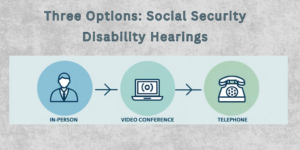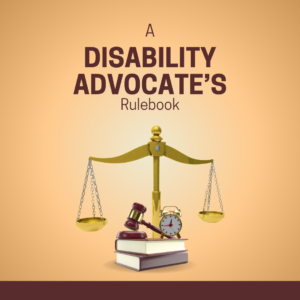Tax season strikes fear in many of us. We can be as organized and ready as ever, but the lurking fear of filing incorrectly always lingers in the back of our minds. The same concept applies when we consider filing for disability.
Think of it like a health examination from the IRS; Social Security will scour our records and everyday lives for indications of our ability to function. Brace yourselves: it’s time for the audit!
What the SSA Looks For
Your Personal Life
If you’ve been following my content for a while, then you’ve already heard me say a thousand times how important it is to fill out an ADL Form (Activity of Daily Living) accurately and truthfully. When the SSA is auditing your disability status, here are some things common everyday activities that they’ll review:
- Your shopping habits
- The intensity of your hobbies
- If you care for children or grandchildren
- What you do when you go out
You shouldn’t look at this as a list of things you can’t do. All of these activities are indicators of how well you function and where your limitations start. For example, do crowds at a mall trigger a panic attack? Are there assistive technologies and tools that make it easier for you to complete everyday tasks?
Don’t forget to include all relevant information in your medical records and ADL Form. It’s best not to assume that the SSA knows where your limitations are, so make sure to clearly explain them.
How You Present Yourself in Court
Here’s a crazy story for you. One time, I was representing a client in court and a judge remarked on my client’s outgoing ability to socialize with others while bummming cigarettes off nearby attendants.
It wasn’t detrimental to their disability claim, but it could have been if the applicant was trying to make a case that they were suffering from an anxiety order so crippling that they couldn’t return to the workforce. Never over-exaggerate your condition, but try to be mindful not to do or say things that would be out of the norm for your everyday life.
Tips for Your Disability Hearing:
- Be honest
- Show up on time
- Chat with a dependable disability representative before your meeting
- Watch what you post on social media
- Prepare a cheat sheet to remember how often you need breaks
- Be candid about your strengths and limitations
Click Here for a Short Explanation About How the SSA Can Legally Observe Disability Applicants
Auditing Medical Records
Let’s say that the SSA ordered copies of your medical records for review. While they’re auditing your doctor’s notes, they find that you’ve recently visited to treat poison ivy, or that you twisted your ankle at your kid’s football game, or you threw out your back trying to lift a box.
Very quickly, these small things turn into bigger questions:
- Why were you wandering through the woods on uneven ground?
- If you’re struggling with crippling anxiety, why were you out at a sporting event?
- How often do you help people with a laborious activity?
Again, it’s not that you can’t go out and do these things. Sometimes an SSA judge has a very difficult job when they’re trying to determine which applicants are authentic and which applicants are trying to take advantage of the system. An audit gives you the opportunity to clarify discrepancies in your file.
My Best Advice for Your Disability Audit
My advice as a disability representative is to communicate clearly with your doctor. More often than not, details will save the day. When you’re in your doctor’s important, volunteer the rest of the story even if your doctor doesn’t ask.
👉 Maybe your grandkid picked some ivy because they thought it was pretty!
👉 Or that you had to take breaks at the softball game to rest your body or your mind, and tripped on your way to the car.
👉 Maybe that box was an Amazon delivery, but you couldn’t even make it two feet before it was too much for you.
By volunteering these small details, you’re also putting the rationale right into the SSA’s hands. Give the judge a compelling reason to believe your story, and always be truthful with both your abilities and your limitations. It makes a world of difference on your audit.
Here’s How Our Disability Representative Can Help!
As a local representative, our disability advocate will know your case from start to finish. We’ll be involved every step of the way, and you’ll speak to the same person every time. Our goal is to make your case the easiest one to approve.
For that reason, we don’t just fine-tune what you have and put it together in a cut-and-paste format. We’ll meticulously review your case and provide feedback on the weak areas of your application and offer clear directions on what information we need and where you can find them.
Whether you’ve already begun the application process or are just getting started, we encourage you to schedule a FREE consultation to help determine the best strategy for your case. Our mission is to eliminate the red tape and mountains of paperwork so you can focus on your health and the things that matter.
Written by Roy, a dedicated Disability Representative, has been advocating for individuals seeking disability-based programs since 2003. With his background working for the government, Roy brings a deep commitment to improving assistance programs for those in need.
⏰ Schedule an appointment from anywhere in the US! 📱
Let’s Connect!
✅ Facebook: Add Me!
✅ Instagram: Join the Fun
✅ Twitter: Follow
✅ YouTube: Subscribe Here
The Disability Process 101:
- Programs available
- How to apply or appeal
- How disability is determined
- Tips for how to build a strong case
Contact Us:
📞 417-812-6698
Ur Disability Rep
Springfield, MO 65804






